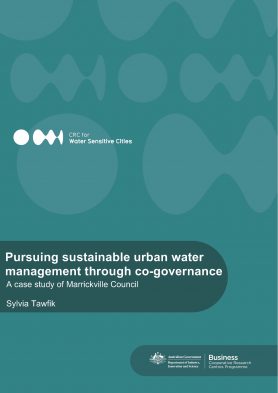Pursuing sustainable urban water management through co-governance – a case study of Marrickville Council
Summary
Achieving sustainable urban environments requires an alternative approach to urban water management. Sustainable urban water management (SUWM) is one such approach that recognises the importance of involving stakeholders in decision-making processes. Scholars have proposed numerous mechanisms for engaging and collaborating with stakeholders. This report focuses on “co-governance”, which describes an inclusive and deliberative approach that emphasises public involvement in the planning, design and management of traditionally governmental functions. The academic literature highlights the importance of co-governance. Such participatory processes can improve governmental accountability and lead to efficiency gains. They may also serve to build trust and mutual understanding between relevant stakeholders, and empower local citizens to take ownership and responsibility for the provision of public services.
Despite these justifications, very few studies have explored the nature and extent of co-governance in contemporary urban water management practices. This report has sought to address calls for empirical contributions by examining one Australian local government’s experience with co-governance in the delivery of SUWM. A qualitative case study approach was used to investigate the historical and contemporary processes that influenced the formation of local co-governance initiatives, and to analyse the factors that contributed to both the success and failure of such initiatives. Marrickville Council was selected as a case study for this research. The selection was based on the Council’s long history of community involvement in SUWM, including recent attempts at co-governance for improving stormwater quality. After tracing the evolution of the Council’s co-governance practices from the early 1990s, the report explores three attempts at co-governance.
The results suggest that co-governance is a complex process that requires considerable effort to sustain in the long-term. Of Marrickville Council’s three attempts at co-governance, only one to date has achieved a true co-governance arrangement. The success of this project was attributed to a highly driven group of locals, an open and willing Council committed to collaboration, and the support of Council leadership. The availability of Council funds was also critical. Although one or more of these factors were present in the other two projects, a series of obstacles ultimately proved more influential. These included the absence or late involvement of key stakeholders, the disinterest or unwillingness of essential participants to assume any ongoing responsibilities, and the presence of conventional project members with a limited understanding of co-governance.
As co-governance is a long-term and resource intensive process, implementing this approach may not be appropriate in all situations. The level of public involvement or mode of collaboration will need to be tailored to the particular parameters of the project and local context. In circumstances where a co-governance approach is deemed appropriate, local governments should consider the three key design lessons that emerged from this case study.
- Build institutional capacity: Internal capacity is critical. The multi-disciplinary group of staff involved in any project need to be appropriately trained and educated on co-governance and community engagement techniques. Additionally, council leadership should actively foster supportive organisational cultures and commitment to collaborative processes.
- Analyse and involve all relevant stakeholders: The form and extent of stakeholder involvement requires careful consideration. Prior to any project, potential stakeholders need to be comprehensively analysed to determine appropriate methods and strategies for engagement. Transaction costs can be minimised through early and continuous stakeholder engagement activities that clearly define expectations and responsibilities.
- Build trust, local capacity and long-term commitment: Trust and local commitment are necessary for sustaining co-governance in the long-term. Council programs designed to build local capacity can also provide a forum for relationship building and the development of local champions. Regular, face-to-face interactions are needed to maintain the momentum and ongoing involvement of non-state participants.
